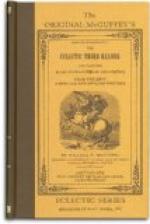In the Fourth Reader there were seventeen selections from the Bible; William Wirt’s “Description of the Blind Preacher;” Phillip’s “Character of Napoleon Bonaparte;” Bacon’s “Essay on Studies;” Nott’s “Speech on the Death of Alexander Hamilton;” Addison’s “Westminster Abbey;” Irving’s “Alhambra;” Rogers’s “Genevra;” Willis’s “Parrhasius;” Montgomery’s “Make Way for Liberty;” two extracts from Milton and two from Shakespeare, and no less than fourteen selections from the writings of the men and women who lectured before the College of Teachers in Cincinnati. The story of the widow of the Pine Cottage sharing her last smoked herring with a strange traveler who revealed himself as her long-lost son, returning rich from the Indies, was anonymous, but it will be remembered by those who read it.
These selections were the most noteworthy ones in the first editions of these readers.
The First and Second Readers of the McGuffey Series were substantially made new at each revision. A comparison of the original Third Reader with an edition copyrighted in 1847, shows that the latter book was increased about one-third in size. Of the sixty-six selections in the early edition only forty-seven were retained, while thirty new ones were inserted. Among the latter were “Harry and his Dog Frisk” that brought to him, punished by being sent to bed, a Windsor pear; “Perseverance,” a tale of kite-flying followed by the poem, “Try, try again;” the “Little Philosopher,” named Peter Hurdle, who caught Mr. Lenox’s runaway horse and on examination seemed to lack nothing but an Eclectic spelling book, a reader and a Testament—which were promised him; “The Colonists,” in which men of various callings offered their services, and while even the dancing master was accepted as of some possible use, the gentleman was scornfully rejected; “Things by Their Right Names,” in which a battle was described as wholesale murder; “Little Victories,” in which Hugh’s mother consoled him for the loss of a leg by telling him of the lives of men who became celebrated under even greater adversities; “The Wonderful Instrument,” which turned out to be the eye; “Metaphysics,” a ludicrous description of a colonial salt-box in affected terms of exactness designed to ridicule some forms of reasoning. Those who used this edition of the third reader will surely remember some of these selections.
[The Bible]
In the Fourth Reader printed in 1844 there were thirty new selections—less than one-third of the book; but some of these were such as will be remembered by those who read them in school. There was “Respect for the Sabbath Rewarded,” in which a barber of Bath had become so poor because he would not shave his customers on Sunday, that he borrowed a half-penny to buy a candle Saturday night to give light for a late customer, and was thus discovered to be the long-lost William Reed of Taunton, heir to many thousand pounds; “The Just Judge,” who disguised himself as a miller and, obtaining a place on the jury, received only five guineas as a bribe when the others got ten, and who revealed himself as Lord Chief Justice Hale and tried the case over in his miller’s clothing; Hawthorne’s “The Town Pump;” Mrs. Southey’s “April Day.”




